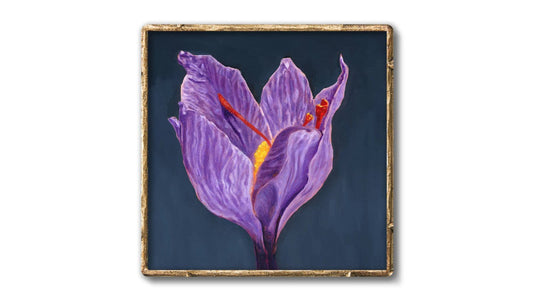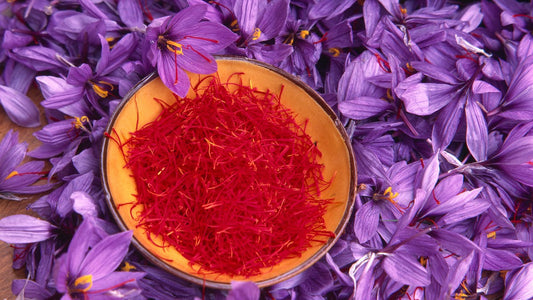
Saffron for Eye Health: A Natural Vision Booster
Ara OhanianShare
Saffron, often referred to as "red gold," is a treasured spice with a rich history of culinary and medicinal uses. Beyond its vibrant color, exquisite aroma, and unparalleled flavor, saffron holds profound health benefits. Among these, its positive impact on eye health has gained significant attention in recent years. But how does saffron support vision, and can it help with common eye-related conditions? In this article, we’ll explore the science-backed benefits of saffron for eye health, its role in protecting vision, and how to incorporate it into your daily routine.
How Saffron Supports Eye Health
Saffron contains powerful bioactive compounds, including crocin, crocetin, safranal, and carotenoids, that contribute to its therapeutic properties. These compounds are known for their antioxidant, anti-inflammatory, and neuroprotective effects, which are crucial for maintaining healthy eyes. Here’s how saffron works to support optimal vision:
- Protects Retinal Cells: Saffron’s antioxidants help protect the retina from oxidative stress and free radical damage, which are major contributors to age-related eye diseases.
- Improves Retinal Function: Studies suggest that saffron can enhance the sensitivity of retinal cells, improving overall visual performance.
- Supports Blood Flow to the Eyes: Crocin, a key compound in saffron, promotes healthy blood circulation in the retina, ensuring the eyes receive adequate oxygen and nutrients.
- Regulates Light Sensitivity: Saffron has been shown to regulate the genes responsible for light sensitivity, preventing photoreceptor damage in the eyes.
Saffron and Age-Related Eye Conditions
One of the most exciting areas of research on saffron is its potential in managing age-related eye conditions. Here are some key findings:
1. Macular Degeneration
Age-related macular degeneration (AMD) is a common condition that affects the central part of the retina, leading to vision loss in older adults. Research has shown that saffron can help slow the progression of AMD. A clinical study found that participants who consumed saffron daily experienced significant improvements in retinal function and visual acuity.
2. Cataracts
Cataracts occur when the eye's lens becomes cloudy, impairing vision. Saffron’s antioxidant properties may help reduce oxidative damage to the lens, potentially delaying the onset of cataracts.
3. Glaucoma
Glaucoma is a condition characterized by increased pressure in the eye, which can damage the optic nerve. Saffron may offer neuroprotective benefits, helping to preserve optic nerve function and protect against vision loss.
4. Diabetic Retinopathy
Diabetic retinopathy is a complication of diabetes that affects the blood vessels in the retina. Saffron’s ability to enhance blood flow and reduce inflammation may support eye health in individuals with this condition.
Scientific Studies Backing Saffron for Eye Health
Several studies have reinforced the benefits of saffron for eye health. For example, a study published in the journal Investigative Ophthalmology & Visual Science found that saffron supplementation improved vision in patients with early-stage AMD. Another study in the journal Evidence-Based Complementary and Alternative Medicine reported that saffron’s crocin compound may help protect retinal cells from degenerative damage.
These findings highlight saffron’s potential as a natural, non-invasive option for supporting eye health and managing vision problems.
How to Use Saffron for Eye Health
Incorporating saffron into your diet is simple and highly rewarding. Here are some ways to enjoy its benefits:
- Saffron Tea: Add a few strands of saffron to warm water or milk to create a soothing, nutrient-rich drink.
- Cooking: Use saffron to flavor dishes like rice, soups, or stews. Its vibrant color and aroma will elevate any meal.
- Saffron Supplements: For those who may find it challenging to include saffron in their meals, saffron supplements are a convenient option. Always consult with a healthcare provider before starting any new supplement regimen.
It’s important to choose high-quality saffron to ensure you’re getting the maximum health benefits. Low-quality or adulterated saffron may lack the necessary bioactive compounds. If you’re looking for premium saffron, check out our Persian Pure Saffron, harvested and processed with care to ensure the highest quality.
Precautions and Considerations
While saffron is generally safe for most people, it’s important to use it in moderation. Consuming excessive amounts of saffron may lead to side effects such as nausea, dizziness, or allergic reactions. Pregnant women, individuals on certain medications, or those with specific health conditions should consult a healthcare professional before using saffron.
FAQs About Saffron for Eye Health
-
1. How much saffron should I take for eye health?
Most studies suggest a dose of 20-30 mg of saffron per day for optimal eye health benefits. However, it’s best to consult a healthcare provider for personalized advice. -
2. How long does it take to see results from saffron for vision?
Some individuals notice improvements in vision within a few weeks of regular saffron use, but results may vary depending on the individual and the condition being treated. -
3. Can saffron cure macular degeneration?
Saffron cannot cure macular degeneration, but it may help slow its progression and improve retinal function when used alongside other treatments. -
4. Is saffron safe for children?
Saffron is generally safe for children when used in small amounts. However, it’s advisable to consult a pediatrician before giving saffron to a child. -
5. How do I know if the saffron I’m using is pure?
Pure saffron has a distinct aroma, deep red color with orange tips, and a slightly bitter taste. Always purchase saffron from trusted sources, such as our Pure Saffron store, to ensure quality and authenticity.
Saffron’s remarkable benefits for eye health make it a valuable addition to your wellness routine. Whether you’re looking to protect your vision, manage age-related eye conditions, or simply enhance your overall health, incorporating saffron into your diet is a natural and effective choice. Explore the power of saffron today and see the difference it can make for your eyes!




